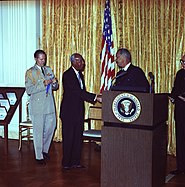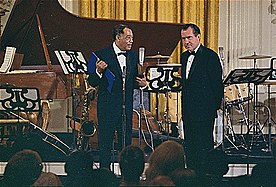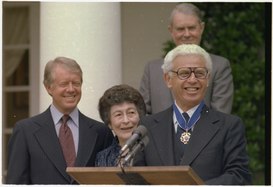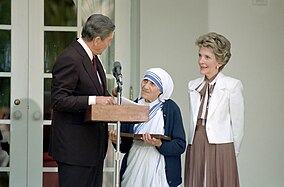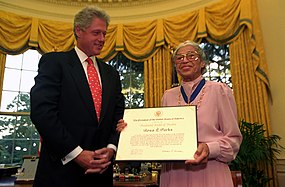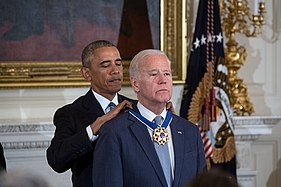Presidential Medal of Freedom
The Presidential Medal of Freedom is the highest civilian award of the United States, alongside the Congressional Gold Medal. It is an award bestowed by decision of the president of the United States to recognize people who have made "an especially meritorious contribution to the security or national interests of the United States, world peace, cultural or other significant public or private endeavors." The award is not limited to U.S. citizens, and, while it is a civilian award, it can also be awarded to military personnel and worn on the uniform. It was established in 1963 by President John F. Kennedy, superseding the Medal of Freedom that was initially established by President Harry S. Truman in 1945 to honor civilian service.
"Medal of Freedom" redirects here. For other uses, see Medal of Freedom (disambiguation).Presidential Medal of Freedom
United States
647 (an average of fewer than 11 per year since 1993)
None
Occasionally, the medal award is further denoted as, "with distinction". There are no specific criteria for receiving the award with distinction; Executive Order 11085 simply specifies that the award should come in two degrees, and hence any decision to award the higher degree is entirely at the discretion of the president. In 2017, President Barack Obama stated that receiving the award with distinction indicates "an additional level of veneration"[3] in a class of individuals already held in the highest esteem. As of January 2022, 26 people have been awarded the medal with distinction, amounting to approximately 4% of all awards.
The Presidential Medal of Freedom is the supreme civilian decoration that can be awarded in discretion of the president, whereas its predecessor, the Medal of Freedom, was inferior in precedence to the Medal for Merit; the Medal of Freedom was awarded by any of three Cabinet secretaries, whereas the Medal for Merit was awarded by the president, as is the Presidential Medal of Freedom.[4]
Overview[edit]
President John F. Kennedy established the presidential version of the decoration in 1963 through Executive Order 11085 (signed February 22, 1963), with unique and distinctive insignia, vastly expanded purpose, and far higher prestige.[2][5] It was the first U.S. civilian neck decoration and, if awarded with Distinction, is the only U.S. sash and star decoration (the Chief Commander degree of the Legion of Merit—which may only be awarded to foreign heads of state—is a star decoration but without a sash). The executive order calls for the medal to be awarded annually on or around July 4, and at other convenient times as chosen by the president,[4] but it has not been awarded every year (e.g., 2001, 2010). Recipients are selected personally by the president, either on the president's own initiative or based on recommendations. The order establishing the medal also expanded the size and the responsibilities of the Distinguished Civilian Service Awards Board so it could serve as a major source of such recommendations.
Marian Anderson and Ralph Bunche received the first Medals of Freedom from President John F. Kennedy on July 4, 1963.
The medal may be awarded to an individual more than once; Colin Powell received two awards, his second being with Distinction;[6] Ellsworth Bunker received both of his awards with Distinction. It may also be awarded posthumously; examples include John F. Kennedy, Steve Jobs, Pope John XXIII, Lyndon Johnson, John Wayne, Paul "Bear" Bryant, Thurgood Marshall, Cesar Chavez, Walter Reuther, Roberto Clemente, Jack Kemp, Harvey Milk, James Chaney, Andrew Goodman, Michael Schwerner, Elouise Cobell, Grace Hopper,[7] Antonin Scalia, Elvis Presley and Babe Ruth.[8] (Chaney, Goodman and Schwerner, civil rights workers murdered in 1964, were awarded their medals in 2014, 50 years later.)
Athlete and activist Simone Biles is the youngest person to receive this award at the age of 25.[9]
Revocation[edit]
There is no process for the award to be revoked. This issue has been raised regarding certain recipients, in particular regarding the award given to actor and comedian Bill Cosby.[12]
